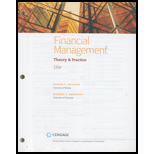
Concept explainers
Lewis’s management has been considering moving to a new downtown location, and they are concerned that these plans may come to fruition prior to the equipment lease’s expiration. If the move occurs then Lewis would buy or lease an entirely new set of equipment, so management would like to include a cancelation clause in the lease contract. What effect would such a clause have on the riskiness of the lease from Lewis’s standpoint? From the lessor’s standpoint? If you were the lessor, would you insist on changing any of the other lease terms if a cancelation clause were added? Should the cancelation clause contain provisions similar to call premiums or any restrictive covenants and/or penalties of the type contained in bond indentures? Explain your answer.
Want to see the full answer?
Check out a sample textbook solution
Chapter 19 Solutions
FINANCIAL MANAGEMENT(LL)-TEXT
- Consider a situation involving determining right and wrong. Do you believe utilitarianism provides a more objective viewpoint than moral rights in this context? Why or why not? How about when comparing utilitarianism to principles of justice? Share your thoughts. Reflect on this statement: "Every principle of distributive justice, whether that of the egalitarian, the capitalist, the socialist, the libertarian, or Rawls, in the end is illegitimately advocating some type of equality." Do you agree or disagree with this assertion? Why might someone claim this, and how would you respond?arrow_forwardI need help checking my spreadsheet. Q: Assume that Temp Force’s dividend is expected to experience supernormal growth of 73%from Year 0 to Year 1, 47% from Year 1 to Year 2, 32% from Year 2 to Year 3 and 21% from year3 to year 4. After Year 4, dividends will grow at a constant rate of 2.75%. What is the stock’sintrinsic value under these conditions? What are the expected dividend yield and capital gainsyield during the first year? What are the expected dividend yield and capital gains yield duringthe fifth year (from Year 4 to Year 5)?arrow_forwardwhat are the five components of case study design? Please help explain with examplesarrow_forward
- Commissions are usually charged when a right is exercised. a warrant is exercised. a right is sold. all of the above will have commissions A and B are correct, C is not correctarrow_forwardWhat is Exploratory Research Case Study? What is the main purpose of Exploratory Research?arrow_forwardplease help with how to solve this thank you.arrow_forward
- Question 25 Jasmine bought a house for $225 000. She already knows that for the first $200 000, the land transfer tax will cost $1650. Calculate the total land transfer tax. (2 marks) Land Transfer Tax Table Value of Property Rate On the first $30 000 0% On the next $60 000 0.5% (i.e., $30 001 to $90 000) On the next $60 000 1.0% (i.e., $90 001 to $150 000) On the next $50 000 1.5% (i.e., $150 001 to $200 000) On amounts in excess of $200 000 2.0% 22 5000–200 000. 10 825000 2.5000.00 2 x 25000 =8500 2 maarrow_forwardQuestion 25 Jasmine bought a house for $225 000. She already knows that for the first $200 000, the land transfer tax will cost $1650. Calculate the total land transfer tax. (2 marks) Land Transfer Tax Table Value of Property Rate On the first $30 000 0% On the next $60 000 0.5% (i.e., $30 001 to $90 000) On the next $60 000 1.0% (i.e., $90 001 to $150 000) On the next $50 000 1.5% (i.e., $150 001 to $200 000) On amounts in excess of $200 000 2.0% 225000–200 000 = 825000 25000.002 × 25000 1= 8500 16 50+ 500 2 marksarrow_forwardSuppose you deposit $1,000 today (t = 0) in a bank account that pays an interest rate of 7% per year. If you keep the account for 5 years before you withdraw all the money, how much will you be able to withdraw after 5 years? Calculate using formula. Calculate using year-by-year approach. Find the present value of a security that will pay $2,500 in 4 years. The opportunity cost (interest rate that you could earn from alternative investments) is 5%. Calculate using the formula. Calculate using year-by-year discounting approach. Solve for the unknown in each of the following: Present value Years Interest rate Future value $50,000 12 ? $152,184 $21,400 30 ? $575,000 $16,500 ? 14% $238,830 $21,400 ? 9% $213,000 Suppose you enter into a monthly deposit scheme with Chase, where you have your salary account. The bank will deduct $25 from your salary account every month and the first payment (deduction) will be made…arrow_forward
 Intermediate Financial Management (MindTap Course...FinanceISBN:9781337395083Author:Eugene F. Brigham, Phillip R. DavesPublisher:Cengage Learning
Intermediate Financial Management (MindTap Course...FinanceISBN:9781337395083Author:Eugene F. Brigham, Phillip R. DavesPublisher:Cengage Learning Business/Professional Ethics Directors/Executives...AccountingISBN:9781337485913Author:BROOKSPublisher:Cengage
Business/Professional Ethics Directors/Executives...AccountingISBN:9781337485913Author:BROOKSPublisher:Cengage EBK CONTEMPORARY FINANCIAL MANAGEMENTFinanceISBN:9781337514835Author:MOYERPublisher:CENGAGE LEARNING - CONSIGNMENTBusiness Its Legal Ethical & Global EnvironmentAccountingISBN:9781305224414Author:JENNINGSPublisher:Cengage
EBK CONTEMPORARY FINANCIAL MANAGEMENTFinanceISBN:9781337514835Author:MOYERPublisher:CENGAGE LEARNING - CONSIGNMENTBusiness Its Legal Ethical & Global EnvironmentAccountingISBN:9781305224414Author:JENNINGSPublisher:Cengage





